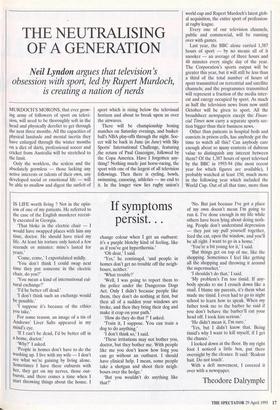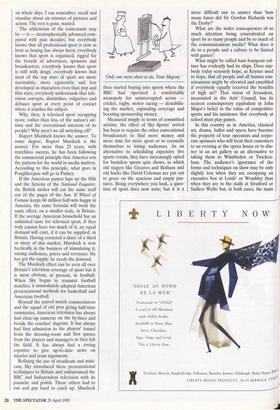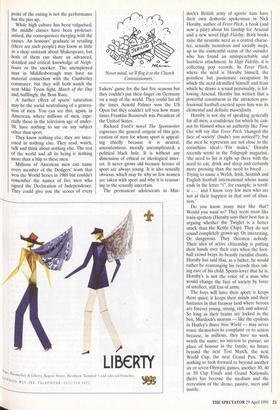THE NEUTRALISING OF A GENERATION
Neil Lyndon argues that television's
obsession with sport, led by Rupert Murdoch, is creating a nation of nerds
MURDOCH'S MORONS, that ever grow- ing army of followers of sport on televi- sion, will need to be thoroughly soft in the head and physically derelict to get through the next three months. All the capacities of physical lassitude and mental inertia they have enlarged through the winter months on a diet of darts, professional soccer and cricket from Australia will be stretched to the limit.
Only the workless, the sexless and the absolutely gormless — those lacking any active interests or talents of their own, any developed social or emotional life — will be able to swallow and digest the surfeit of sport which is rising below the televisual horizon and about to break upon us over the airwaves.
There will be championship boxing matches on Saturday evenings, and basket- ball's NBA play-offs through the night. Soc- cer will be back in June (in June) with Sky Sports' International Challenge, featuring ,the return of Paul Gascoigne, followed by the Copa America. Have I forgotten any- thing? Nothing much: just horse-racing, the sport with one of the largest of all television followings. Then there is cycling, bowls, swimming, canoeing, athletics — no end to it. In the longer view lies rugby union's world cup and Rupert Murdoch's latest glob- al acquisition, the entire sport of profession- al rugby league.
Every one of our television channels, public and commercial, will be running over with games.
Last year, the BBC alone carried 1,387 hours of sport — by no means all of it snooker — an average of three hours and 48 minutes every single day of the year. The Corporation's sports output will be greater this year, but it will still be less than a third of the total number of hours of sport transmitted on terrestrial and satellite channels; and the programmes transmitted will represent a fraction of the media inter- est and energy occupied by sport. As much as half the television news from now until October will be given to sport. All the broadsheet newspapers except the Finan- cial Times now carry a separate sports sec- tion bigger than their business news.
Other than patients in hospital beds and convicts in prison cells, has anybody got the time to watch all this? Can anybody care enough about so any 'contests of dubious value to distinguish any interest between them? Of the 1,387 hours of sport televised by the BBC in 1993-94 (the most recent year for which figures are available), I probably watched at least 150, much more in the following year which included the World Cup. Out of all that time, more than six whole days, I can remember, recall and visualise about six minutes of pictures and action. The rest is gone, wasted.
The athleticism of the contestants may be — is — stratospherically advanced com- pared with past decades; but everybody knows that all professional sport is now as bent as boxing has always been; everybody knows that sport is organised, rigged for the benefit of advertisers, sponsors and broadcasters; everybody knows that sport is stiff with drugs; everybody knows that most of the top stars of sport are more narcissistic, more egocentric and less developed as characters even than pop and film stars; everybody understands that tele- vision corrupts, diminishes, vulgarises and debases sport at every point of contact where it touches the subject.
Why, then, is televised sport occupying more, rather than less, of the nation's air- time and the recreational interests of its people? Why aren't we all switching off?
Rupert Murdoch knows the answer. To some degree, Rupert Murdoch is the answer. For more than 25 years, with matchless success, he has been following the commercial principle that America sets the pattern for the world in media matters. According to this principle, what goes in Poughkeepsie will go in Pudsey.
If the American punter laps up the filth and the fictions of the National Enquirer, the British sucker will eat the same stuff out of the pages of the Sun. If Wheel of Fortune keeps 60 million half-wits happy in America, the same formula will work the same effect, on a smaller scale, in Britain. If the average American household has an unlimited taste for televised sport, if they truly cannot have too much of it, an equal demand will exist, if it can be supplied, in Britain. Having cornered a share of a third or more of this market, Murdoch is now hectically in the business of stimulating it, raising audiences, prices and revenues. He has got the supply: he needs the demand.
The Murdoch effect can be seen all over Britain's television coverage of sport but it is most obvious, at present, in football. When Sky began to transmit football matches, it immediately adopted American presentational methods for basketball and American football.
Beyond the paired match commentators and the squad of old pros giving half-time summaries, American television has always had close-up cameras on the by-lines and beside the coaches' dugouts. It has always had first admission to the players' tunnel from the dressing-room and first quotes from the players and managers as they left the field. It has always had a roving reporter to give up-to-date news on injuries and team arguments.
Refining the use of steadicam and mini- cam, Sky introduced these presentational techniques to Britain and embarrassed the BBC and Independent television with its panache and polish. Those others had to run and pay hard to catch up. Murdoch `Only one more sheet to do, Your Majesty.'
then started buying into sports where the BBC had operated a comfortable monopoly for uninterrupted aeons cricket, rugby, motor racing — destabilis- ing the market, expanding coverage and boosting sponsorship money.
Measured simply in terms of committed airtime, the effect of Sky Sports' arrival has been to require the other conventional broadcasters to find more money and more time for more sport or to reconcile themselves to losing audiences. As an alternative to scheduling expensive live sports events, they have increasingly opted for brainless sports quiz shows, in which old stagers like Greaves and Botham and old hacks like David Coleman are put out to graze on the spacious and empty pas- tures. Being everywhere you look, a ques- tion of sport does now arise; but it is a more difficult one to answer than 'how many times did Sir Gordon Richards win the Derby?'
What are the wider consequences of so much attention being concentrated on sport by so many people and by so much of the communications media? What does it do to a people and a culture to be fixated with games?
What might be called haut bourgeois cul- ture has evidently had its chips. Does any- body today seriously hope, as Keynes used to hope, that all people and all human con- sciousness might be elevated and ennobled if everybody equally received the benefits of high art? That vision of Jerusalem, incarnated in the Arts' Council, has its nearest contemporary equivalent in John Major's belief in the value of competitive sports and his insistence that everybody at school must play games.
In this country as in America, classical art, drama, ballet and opera have become the property of tour operators and corpo- rate sponsors who will treat their customers to an evening at the opera house or to din- ner in an art gallery as an alternative to taking them to Wimbledon or Twicken- ham. The audience's ignorance of the forms and techniques on show may be only slightly less when they are occupying an executive box at Lords' or Wembley than when they are in the stalls at Stratford or Sadlers Wells; but, in both cases, the main point of the outing is not the performance but the piss-up.
While high culture has been vulgarised, the middle classes have been proletari- anised, the consequences merging with the causes. An honours' graduate in retailing (there are such people) may know as little as a shop assistant about Shakespeare, but both of them can share an advanced, detailed and critical knowledge of Neigh- bours or the snooker. The unemployed man in Middlesborough may have no material connection with the Camberley commuter; but they will both watch the next Mike Tyson fight, Match of the Day and, bafflingly, the Boat Race.
A further effect of sports' saturation may be the social neutralising of a genera- tion of men. You can see this, again, in American, where millions of men, espe- cially those in the television age of under- 50, have nothing to say on any subject other than sport.
They know nothing else, they are inter- ested in nothing else. They read, watch, talk and think about nothing else. The rest of the world and all its being is nothing more than a blip to these men.
Millions of American men can name every member of the Dodgers' team that won the World Series in 1988 but couldn't remember the names of five men who signed the Declaration of Independence. They could give you the scores of every `Never mind, we'll flog it to the Church Commissioners.'
Lakers' game for the last five seasons but they couldn't put their finger on Germany on a map of the world. They could list all the times Arnold Palmer won the US Open but they couldn't tell you how many times Franklin Roosevelt was President of the United States.
Richard Ford's novel The Sportswriter expresses the general zeitgeist of this gen- eration of men for whom sport is appeal- ing chiefly because it is neutral, uncontentious, morally uncomplicated, a • political black hole. It is without any dimension of ethical or ideological inter- est. It never grows old because heroes of sport are always young. It is also sexually obvious, which may be why so few women are taken with sport and why it is reassur- ing to the sexually uncertain.
The permanent adolescents in Mur- doch's British' army of sports' fans have their own dotbestic spokesman in Nick Hornby, author of Fever Pitch, a book (and now a play) about his fanship for Arsenal and a new novel High Fidelity. Both books raise the neurotic nerd as a central charac- ter, sexually tremulous and socially inept, up to the existential status of the outsider who has found an unimpeachable and harmless attachment. In High Fidelity, it is collecting pop records. In Fever Pitch, where the nerd is Hornby himself, the pointless but passionate occupation by which the nerd identified himself and from which he draws a sexual personality, is fol- lowing Arsenal. Hornby has written that a powerful constituent in the attraction pro- fessional football exerted upon him was its elemental and definite masculinity.
Hornby is not shy of speaking generally for all men, a confidence for which he can- not be blamed when an authority like Time Out will say that Fever Pitch 'changed the face of society' (hadn't you noticed?); but the men he represents are not close to the corinthian ideals Tdr males,' Hornby recently wrote in the Telegraph magazine, `the need to list is right up there with the need to eat, drink and sleep and certainly more pressing than the need to breed . . . Trying to name a Welsh, Irish, Scottish and English football international whose name ends in the letter "i", for example, is terrif- ic . . . and I know very few men who are not at their happiest in that sort of situa- tion.'
Do you know many men like that? Would you want to? They seem most like train-spotters (Hornby says their best fun is arguing whether the Twiglet is a better snack than the Kettle Chip). They do not sound completely grown-up. Or interesting. Or dangerous. They threaten nobody. Their idea of active citizenship is putting their hands over their ears when the foot- ball crowd brays its beastly racialist chants. Hornby has said that, as a father, he would rather be rearranging his records than tak- ing care of his child. Sports-lover that he is, Hornby's is not the voice of a man who would change the face of society by force of intellect, still less of arms.
The boys will have their sport; it keeps them quiet; it keeps their minds and their fantasies in that faraway land where heroes are forever young, strong, rich and adored. So long as their brains are locked in the box, Murdoch's morons — like the epsilons in Huxley's Brave New World — may never rouse themselves .to complaint or to action because, in millions, they have no work worth the name; no interest to pursue; no place of honour in the family; no future beyond the next Test Match, the next World Cup, the next Grand Prix. With nothing to look forward to beyond another six or seven Olympic games, another 30, 40 or 50 Cup Finals and Grand Nationals, theirs has become the medium and the recreation of the drone, passiVe, inert and inutile.




























































 Previous page
Previous page